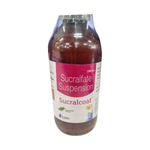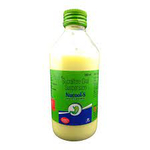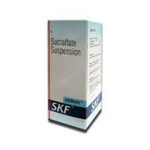Sucfate Suspension

Sucfate Suspension
Introduction to Sucfate Suspension
Sucfate Suspension is a medication primarily used to treat and prevent ulcers in the stomach and intestines. It works by forming a protective barrier over ulcers or damaged areas, promoting healing and protecting the stomach lining from further damage.
Composition of Sucfate Suspension
The active ingredient in Sucfate Suspension is Sucralfate, which binds to ulcer surfaces and creates a gel-like coating. This coating shields the ulcer from stomach acids and other irritants.
Uses of Sucfate Suspension
- Treats and prevents gastric and duodenal ulcers
- Helps with acid reflux and gastritis
- Prevents stress ulcers in critically ill patients
- Protects the stomach lining from damage caused by certain medications
Side effects of Sucfate Suspension
Common side effects:
- Constipation
- Dry mouth
- Stomach discomfort
Serious side effects:
- Allergic reactions such as rash or itching
- Gastrointestinal issues like nausea or vomiting
- Dizziness
- Difficulty breathing or swelling (requires immediate medical attention)
Precautions of Sucfate Suspension
Sucfate Suspension should be used with caution in individuals with kidney problems due to the risk of aluminum buildup. It is contraindicated in patients with hypersensitivity to the drug or its components. It can interfere with the absorption of certain medications, vitamins, and minerals, so it should be taken separately, typically 30 minutes apart. Avoid taking it within 2 hours of antacids as this may reduce its effectiveness.
How to Take Sucfate Suspension
- Take 10 milliliters (1 gram) of Sucfate Suspension four times a day.
- Consume on an empty stomach, at least 1 hour before meals or 2 hours after meals.
- Swallow tablets whole with water; do not chew or crush.
Conclusion of Sucfate Suspension
Sucfate Suspension is an effective medication for treating and preventing ulcers in the stomach and intestines. By forming a protective barrier, it promotes healing and protects the stomach lining from further damage. Always follow your healthcare provider's instructions and be aware of potential side effects and precautions.
Similar Medicines
Related Faqs

Is Acefate available or sold over the counter?
No Acefate is a medication that requires a prescription from a healthcare professional It is not accessible for purchase without a prescription Acefate is classified as a prescription drug due to its potentially potent effects and the need for medical supervision in determining the appropriate dosage and duration of treatment As a prescriptiononly medication Acefate is regulated to ensure patient safety and prevent misuse or unintended complications It is crucial for individuals to consult with their healthcare provider before considering the use of Acefate to ensure that it is suitable for their specific medical condition and to receive proper guidance on its usage Under no circumstances should Acefate be taken without a prescription as this can pose serious health risks and may interfere with existing medical treatments or conditions It is always recommended to seek professional medical advice before initiating any new medication or treatment plan

Is Sucfate a narcotic drug?
No Sucfate is not classified as a narcotic drug Sucfate also known as sucralfate is a medication that belongs to a group called gastric protectants It is primarily used to treat and prevent ulcers in the stomach and intestines Unlike narcotic drugs which are substances that affect the central nervous system and can cause addiction Sucfate works in a different way It forms a protective coating over the ulcers acting as a barrier against stomach acid bile salts and enzymes This protective layer helps to promote healing and reduce inflammation in the affected areas Narcotic drugs on the other hand have different mechanisms of action They bind to receptors in the brain and spinal cord effectively blocking pain signals and producing a sense of euphoria These drugs have a high potential for abuse and addiction and their use is strictly regulated due to the associated risks and side effects It is important to distinguish between Sucfate and narcotic drugs as they serve different purposes and have distinct effects on the body Sucfate is a safe and effective medication used to treat ulcers while narcotic drugs are powerful pain relievers that carry significant risks

Is Sucfate available or sold over the counter?
No Sucfate is not an overthecounter medication It is a prescription drug that requires a valid prescription from a healthcare professional Sucfate also known as sucralfate is commonly used to treat ulcers particularly those in the stomach and upper part of the small intestine It works by forming a protective coating over the damaged area allowing it to heal more effectively When prescribed Sucfate is typically taken orally usually four times a day on an empty stomach It should be taken at least one hour before meals or two hours after meals for optimal absorption The dosage and duration of treatment may vary depending on the specific condition being treated and the individuals response to the medication As with any medication there can be potential side effects associated with Sucfate These may include constipation dry mouth upset stomach and dizziness It is important to discuss any existing medical conditions or allergies with your healthcare provider before starting Sucfate to ensure it is safe and appropriate for you While it may be tempting to try selfmedication it is crucial to seek proper medical advice and obtain a prescription for Sucfate This will help ensure that you receive the correct dosage and appropriate monitoring throughout your treatment period

Can I take Sucfate with Prilosec/Nexium/ Tylenol/Zantac/ibuprofen/Pepto?
Yes Sucfate can be safely used in conjunction with medications such as Prilosec Nexium Tylenol Zantac ibuprofen and PeptoBismol However it is crucial to consult with your doctor before taking any medication combination to ensure its suitability for your specific condition Sucfate also known as sucralfate is a medication commonly prescribed to treat ulcers and other gastrointestinal conditions It works by forming a protective coating on the lining of the stomach and intestines which helps to alleviate symptoms and promote healing While Sucfate is generally welltolerated it is essential to discuss the concurrent use of this medication with other drugs with your healthcare provider to avoid potential interactions or adverse effects Prilosec and Nexium belong to a class of medications called proton pump inhibitors that reduce stomach acid production Tylenol is an overthecounter pain reliever while Zantac is an overthecounter medication for acid reflux and PeptoBismol is used for symptoms like upset stomach and diarrhea By consulting your doctor they can determine the appropriate dosage and frequency for each medication considering your specific needs and medical history while minimizing any potential risks Remember selfmedication without professional advice may lead to complications or ineffective treatment Therefore it is always recommended to consult your doctor or pharmacist before combining medications to ensure their safety and effectiveness in addressing your health concerns

Is Nikocid an antibiotic/sulfa drug/pain-killer/PPI?
that is used to treat and prevent ulcers in the stomach and intestines Nikocid works by creating a protective coating on the ulcers allowing them to heal and preventing further damage from stomach acid This medication is commonly prescribed to individuals who have conditions such as gastritis peptic ulcers or gastroesophageal reflux disease GERD Nikocid belongs to a class of drugs known as cytoprotectants which are specifically designed to protect the lining of the gastrointestinal tract Unlike antibiotics sulfa drugs PPIs or painkillers Nikocid focuses on providing a barrier against irritation and damage rather than directly targeting bacterial infections or reducing acid production It should be noted that Nikocid is not intended for immediate relief of symptoms such as heartburn or indigestion but rather for the longterm management and prevention of ulcers It is important to follow the recommended dosage and usage guidelines provided by a healthcare professional when taking Nikocid
Related Posts

1:15
Is Your Baby Suffering From Acid Reflux?

1:15
Where do stomach acid come from?

1:15
Heartburn or Acid Reflux?

1:15
Do you experience stomach bloating? Let us investigate the core reason..

1:15
The Best Foods to Eat and Avoid In Stomach Ulcer.

1:15
What Are the Best Foods to Keep Your Kid’s Brain Healthy?

1:15
How Does Vitamin D3 Deficiency Affect Your Body? Shocking Symptoms Revealed!

1:15
Why Is Calcium Important for Kids? Common Deficiency Symptoms You Shouldn’t Ignore!

1:15
How to Increase Your Child’s Weight Naturally? Healthy Diet Tips for Parents!

1:15
Are Your Hormones Out Of Balance? Signs & Symptoms!
Disclaimer : This information is not a substitute for medical advice. Consult your healthcare provider before making any changes to your treatment . Do not ignore or delay professional medical advice based on anything you have seen or read on Medwiki.
Sucfate Suspension
Prescription Required
Packaging :
bottle of 170 ml Suspension
Manufacturer :
The Pharmed Research Lab Pvt LtdComposition :





























.svg)
